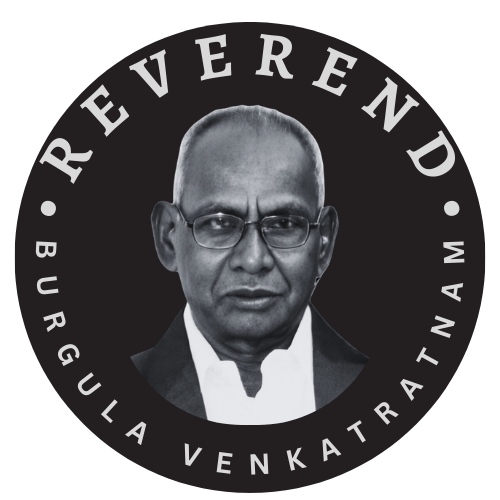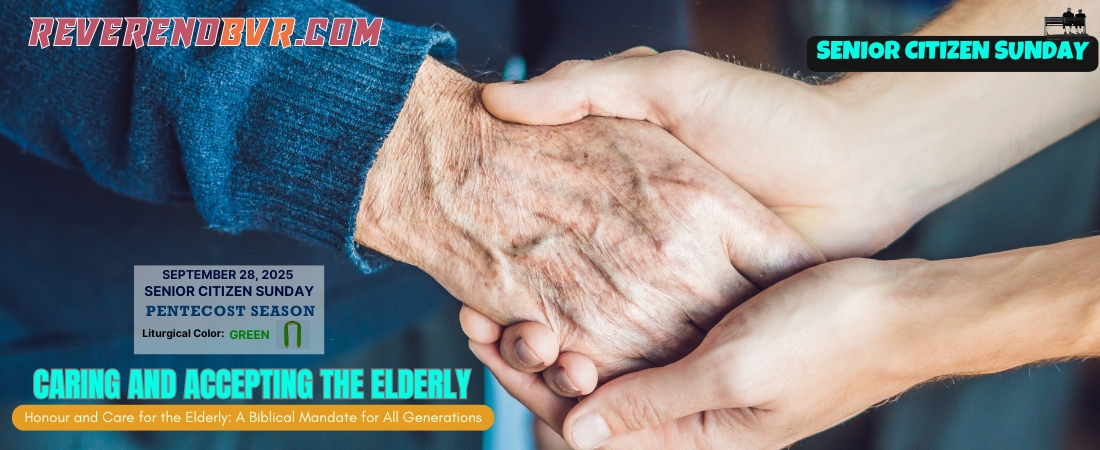In an aging world often marked by neglect and loneliness, the Bible calls us to honour and care for the elderly as a sacred, intergenerational mandate. Rooted in stories like Joseph’s care for Jacob and Paul’s instructions to Timothy, this sermon reminds the Church that honouring elders is not merely tradition but a divine command reflecting God’s faithfulness and the enduring dignity bestowed by Christ.
Sermon Title: Caring and Accepting the Elderly: Honour and Care for the Elderly: A Biblical Mandate for All Generations
Occasion: Senior Citizen’s Sunday | September 28, 2025, Sunday.
Textual Foundations: Genesis 46:28–47:10 | 1 Timothy 5:1–10 | Luke 2:25–35 | Psalm 21
Original Language Reflections: (For deeper study, see Section 5 in the below sermon): Refer Table explaining Hebrew & Greek Words.
Website: www.reverendbvr.com
1. Introduction: A Crisis of Honour in an Aging World
As global life expectancy rises, so does the proportion of elderly individuals in our communities. The United Nations reports that by 2050, one in six people worldwide will be over the age of 65. In many nations—including India—this demographic shift is rapidly unfolding. However, the increase in longevity is not always matched by an increase in dignity. Loneliness, neglect, and abandonment afflict many of the elderly. This reality starkly contrasts the biblical vision of intergenerational honour, especially the Fifth Commandment: “Honour your father and your mother, that your days may be long in the land…” (Exodus 20:12, ESV).
This sermon explores the biblical mandate for honouring and caring for the elderly as a communal responsibility rooted in divine love and covenant fidelity.
I. Jacob in Egypt: Honouring Elders with Presence and Provision (Genesis 46:28–47:10)
The story of Jacob’s migration to Egypt offers a profound narrative of honour, recognition, and generational blessing. Joseph, now a powerful Egyptian vizier, does not forget his aging father. Rather, he orchestrates a royal reception for Jacob and ensures his settlement in Goshen—Egypt’s most fertile region.
The Hebrew word כָּבֵד (kābēd)—“to honour,” also used in the Fifth Commandment—conveys weightiness or glory. Joseph honours Jacob with profound emotional and material kābēd. He weeps upon seeing him (Gen. 46:29), presents him to Pharaoh (Gen. 47:7), and ensures his final years are marked by dignity.
Here, Joseph models a theology of intergenerational blessing: the young must not only receive the wisdom of the old but also provide for their wellbeing. Theologically, it is a reflection of God’s faithfulness through generations (cf. Psalm 100:5). Socially, it becomes a paradigm for diaspora communities: do not abandon your elders in pursuit of success.
II. The Church as a Household of Honour (1 Timothy 5:1–10)
Paul’s instructions to Timothy in Ephesus provide ecclesial guidance for honouring older members of the faith community. He urges Timothy: “Do not rebuke an older man harshly, but exhort him as if he were your father” (1 Tim. 5:1). The Greek term πρεσβύτερος (presbyteros)—though it may denote an elder in office—also conveys age and status. Older women are to be treated as mothers, and the community is to honour widows who are “really in need.”
Paul constructs the Church as a household (οἶκος) of mutual respect, intergenerational accountability, and active care. He sets clear conditions: families are first responsible for their aging members (1 Tim. 5:4), and the Church should only step in when no one else will (v. 5, 16). However, care is not merely material. Paul emphasizes that the aged who have led godly lives—raising children, showing hospitality, and washing the feet of saints—are to be honoured (v. 10), using the term τιμάω (timaō), meaning “to value, revere, or reward.”
Here, Paul echoes the ancient Jewish ethic of honour from Torah and Temple traditions, now transposed into ecclesial life. The Church is not merely a worshipping body, but a sanctuary for the aged, a prophetic alternative to the ageism of Greco-Roman culture—and our own.
III. Simeon and Anna: The Prophetic Role of the Elderly (Luke 2:25–35)
In Luke’s nativity narrative, Simeon and Anna are not passive observers of salvation; they are active prophets and participants. Simeon, described as righteous and devout, had been waiting for the παράκλησις τοῦ Ἰσραήλ (consolation of Israel). The Holy Spirit rested upon him (Luke 2:25)—a rare phrasing that evokes Old Testament prophetic tradition (cf. Numbers 11:25).
Simeon recognizes the Christ child and utters the Nunc Dimittis—a hymn of eschatological peace (Luke 2:29–32). His words affirm that aging does not imply spiritual retirement. Likewise, Anna, a widow of great age, is described as a prophetess who worships night and day (Luke 2:36–38).
These two figures represent a theology of aging in mission. Far from being irrelevant, the elderly are bearers of memory, discerners of God’s presence, and proclaimers of hope. They fulfill Joel’s prophecy: “Your old men shall dream dreams” (Joel 2:28). Their ministry contradicts cultural trends that idolize youth and marginalize age.
IV. Psalm 21: Dignity Bestowed by the King of Kings
Psalm 21—traditionally attributed to David—celebrates divine favour upon the king, including long life and glory: “He asked life of you; you gave it to him, length of days forever and ever” (v. 4). This royal blessing is not merely political; it’s eschatological. In Christ, the true King, this blessing becomes the inheritance of all the faithful.
For the elderly, this Psalm affirms a God who not only prolongs life but dignifies it. The divine presence bestows glory and majesty (v. 5), a striking counter-narrative to worldly views of aging as decline.
2. Conclusion: A Call to Counter-Cultural Faithfulness
To honour and care for the elderly is not optional—it is a divine mandate, woven into the very fabric of biblical ethics. In Genesis, Joseph models filial responsibility. In the Pastoral Epistles, Paul commands ecclesial solidarity. In the Gospel, Luke celebrates the prophetic vitality of the aged. In the Psalms, dignity and glory are gifts from God, not human achievement.
In a world increasingly inclined to ignore, isolate, or institutionalize the elderly, the Church must become a counter-cultural community—a place where age is revered, wisdom is honoured, and care is intentional.
3. Practical Implications: Becoming a Church that Honours
- Family Responsibility: Reclaim the biblical vision of intergenerational living, where children care for aging parents not as a burden but as a blessing (cf. Exodus 20:12; Proverbs 23:22).
- Ecclesial Practice: Establish ministries that engage, not merely serve, the elderly—Bible studies, prayer groups, oral history projects, and pastoral visits.
- Public Witness: Advocate for policies and social programs that protect the dignity of the aged—pensions, healthcare, housing, and inclusion in decision-making.
- Spiritual Formation: Teach younger generations the spiritual value of aging: endurance, wisdom, memory, and hope.
4. Closing Prayer
Eternal God, Ancient of Days, You have walked with your servants from cradle to crown, and have crowned their gray hairs with glory. Teach us to honour those whose strength has waned but whose wisdom has deepened. Help us build homes and churches that shelter, celebrate, and serve the aged. In the name of Christ, who was recognized by Simeon and Anna, and who honours every stage of life, we pray. Amen.
5. Learn Words from the Original Scriptures (For deeper understanding and meditation on today’s theme) :
| S.No | Word (Click on each Word to view its lexical details) | Language | Transliteration | Meaning |
| 1 | כָּבֵד | Hebrew | kābēd | To honour, be heavy, glorify |
| 2 | πρεσβύτερος | Greek | presbyteros | Elder (by age or office), senior |
| 3 | τιμάω | Greek | timaō | To honour, value, revere |
| 4 | οἶκος | Greek | oikos | House, household, family |
| 5 | παράκλησις | Greek | paraklēsis | Consolation, comfort, encouragement |
| 6 | ἅγιος πνεῦμα | Greek | hagios pneuma | Holy Spirit, set-apart breath/spirit |
| 7 | נָשִׂיא | Hebrew | nāśî’ | Prince, ruler, leader (implied in Psalm 21) |
Bibliography
- Fee, Gordon D. 1 and 2 Timothy, Titus. New International Biblical Commentary. Peabody, MA: Hendrickson Publishers, 1988.
- Hamilton, Victor P. The Book of Genesis, Chapters 18–50. New International Commentary on the Old Testament. Grand Rapids: Eerdmans, 1995.
- Marshall, I. Howard. The Pastoral Epistles. International Critical Commentary. Edinburgh: T&T Clark, 1999.
- Nolland, John. Luke 1:1–9:20. Word Biblical Commentary. Dallas: Word Books, 1989.
- Wenham, Gordon J. Genesis 16–50. Word Biblical Commentary. Dallas: Word Books, 1994.
- Hauerwas, Stanley, and Jean Vanier. Living Gently in a Violent World: The Prophetic Witness of Weakness. Downers Grove, IL: IVP Books, 2008.
- Long, Thomas G. Preaching from Memory to Hope. Louisville: Westminster John Knox Press, 2009.
- MacKinlay, Elizabeth. The Spiritual Dimension of Ageing. London: Jessica Kingsley Publishers, 2001.
- Wuthnow, Robert. Growing Old in a Changing Society: Aging and the Elderly in the 21st Century. Princeton, NJ: Princeton University Press, 2007.
- Ministry of Statistics and Programme Implementation (MoSPI), Government of India. Elderly in India – 2021 Report.
- United Nations Department of Economic and Social Affairs, Population Division. World Population Ageing 2023 Highlights. Accessed May 2025.
- World Health Organization (WHO). India: Ageing and Health. https://www.who.int
- Reverend B.V.R. Sermon Archive. “Caring and Accepting the Elderly: A Biblical Mandate for All Generations.” Accessed May 2025. www.reverendbvr.com. (Primary publication site of the sermon.)
© 2025 ReverendBVR.com | High-Academic Sermon Series, 2025.
Content licensed under Creative Commons Attribution-NonCommercial-NoDerivatives 4.0 International (CC BY-NC-ND 4.0). You are free to share — copy and redistribute the material in any medium or format with proper attribution. No commercial use or modifications allowed without explicit permission.
For further sermons and biblical reflections, please visit 🌐 www.reverendbvr.com/sermons

